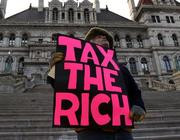
"Tax the Rich" is not enough
Beyond “Tax the Rich”
Heard on The Old Mole Variety Hour, May 14, 2012.
Issues that were kept alive for decades only in small, left-leaning venues like KBOO and the Old Mole have come out into the open political mainstream, thanks to the Occupy Movement. Take for example the injustice of a tax system that permits super rich corporations and individuals to pay taxes at lower rates than working people. “Tax the Rich” is a slogan often seen at Occupy demonstrations, and it has reached the halls of congress. The “Buffett Rule,” which would impose a minimum 30% effective federal tax rate on those with adjusted gross incomes above $1 million…,”(money.CNN) was put forward in the Senate, supported by the President, but rejected by the Republicans. Perhaps the Occupy movement deserves much of the credit for bringing this, along with other issues of economic justice, into the public eye.
Occupy’s central critical idea is that a tiny minority (many fewer than 1%, in fact) of wealthy individuals and institutions control the lives of the rest of us. And what gives Occupy its truly radical potential is that it is but a short step from that idea to the essential corruption and injustice built into the economic and political system of capitalism. What is it that makes the 1% powerful? That they own the capital that our labor has produced and they use their control of capital to maintain and increase their control – for example, by conniving with bought politicians to shift the costs of government off their backs and onto the rest of us. In other words, the real, but largely implicit, message of Occupy is what Barbara Foley in a recent talk to Occupiers in Boston called “the complete illegitimacy of the capitalist system.”
The slogan “Tax the Rich” does draw attention to the existence of gigantic amounts of wealth held in private and corporate hands, and to the power of those who control that wealth to determine government policies that affect us all – for example, tax rates. But taken by itself, “Tax the Rich” fails to question the legitimacy of the system in two important ways. For one thing, it assumes that the additional revenue raised by higher taxes on the wealthy would be used for the common good – infrastructure, public housing, alternative forms of energy, and education. But as long as the government is bought and paid for by the owners of capital, additional revenue is likely to vanish down the same rabbit holes as now. A case in point would be military spending which generates huge profits for major corporations. Portland economist Marty Hart-Landsberg, a frequent guest on the Old Mole, recently calculated that “61.2% of the general tax payments made by [a typical two-earner family] are going to fund military activities, past, present and future. Said differently, out of every tax dollar that this couple pays into our general tax fund, Congress is sending approximately 61 cents to support military activities” – and I’ll link to the blog post that shows how Marty reached this figure. Taxing the rich does nothing to change this.
In Barbara Foley’s talk in Boston, she urges Occupiers to always think about how the obvious issues that bring people into the movement – like the absurdly low taxes paid by the rich – can lead to an understanding that the capitalist system cannot be reformed and must be replaced. Human life – indeed all life – cannot survive another century of a massive system that places the production of profits for the few over the needs of the many. So while we might well start with the outrage people feel about taxation, first expressed in the demand that the rich pay their fair share, the next thing to say, with Barbara Foley, is that they, the rich, “don’t have any fair share of anything that is produced in this society.” All their wealth is ill-gotten, expropriated from the labor of the rest of us. So the problem is not to change the system of taxation, but to change the system of private property that funnels a controlling interest in the economy to the 1%.
Occupy is, and perhaps always will be, a work in progress, a public forum in which people are able to begin with the experiences of their lives and the obvious forms of injustice, but through discussion and education, move beyond entry-level issues like tax fairness to get to the root questions about how this society is structured and how it must be restructured to meet the long-term needs of us all.
I’m Clayton Morgareidge for the Old Mole Variety Hour.
May 14, 2012


